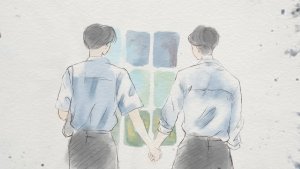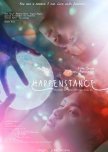Deze recentie kan spoilers bevatten
Defying time
Brilliant idea but lacklustre execution, unfortunately! I was hooked after two episodes, so much so, I subscribed to Gagaoolala in order to finish it. It did not keep its promise, sadly!
There are two different time periods that suddenly due to supermoon, get in touch and two sad men start talking to each other across time! Something happens between them but of course, there are so many obstacles in their way that nothing can come out of their love story. Just more regret and sadness.
The characters are very real and I loved the Wade's mother: open, helpful, optimistic, friendly an ideal mother in short!
The cinematography is stunning. It gives the whole series an out of the world, hazy and dreamy feeling, as befitting a fantasy! Beside interesting camera angles, the two time periods are filmed differently. Wade in 2020, pandemic and isolation, is all white, overexposed and too bright. Jose Manuel in 1974 is just like the Marcos dictatorship historical period: hopeless, dark and sad. The only bright points are JM's T-shirts. Wade's T-shirts also carry a message connected to the story
.
The music is moody and ominous announcing from the first seconds that this is not going to be a happy story! The huge problem is the sound recording: very bad!
The writing is original though a bit draggy and it is not very clear at which speed the time moves. They start communicating through letters: I love that concept. Their ability to communicate is due to the full moon. But that full moon usually lasts no more than three night every four weeks. Here it seems that they talk to each other every day and that there is the full moon in the clear sky every day as well (the shots of the moon are too frequent to correspond to reality!). They talk through the mirrors but sometimes they seem to see each other and sometimes they seem to be talking to themselves in the mirror: so it is not really clear how the whole communication thing works. They can talk to each other every day but they can see each other only when it is the full moon. Maybe I missed something? Another issue I found strange is that Wade thinks of finding the contemporary JM only after he definitely looses contact with him. While they were talking to each other Wade was never curious to find him in 2020?
The writers used the legend of Sidapa and Libulan which is tale of a controversial love affaire of two male deities in precolonial Filipino myth showing how impossible can become possible if you don't give up.
But the most interesting part were the episodes' titles which are the most romantic untranslatable words from a variety of languages:
1. YUAN FEN: (mandarin) fate or chance that brings people together predestined affinity or relationship (Budd.) destiny. Being able to provide explanations in a positive way, Yuanfen has always functioned as an attribution, the psychological process of seeking reasons for particular events.
2. FORELSKET is a Danish word that means in love, enamoured, or in love with. Forelsket is also a Norwegian word for the magical state of falling in love: it is exhilarating partially because it’s so impossible to control. It’s that fluttery, heart-pounding, palms-sweating, complete bliss that you feel when you’re first falling in love.
3. SAUDADE is a Portugese word for the emotional state of melancholic or profoundly nostalgic longing for a beloved yet absent something or someone. It derives from the Latin word for solitude. It is often associated with a repressed understanding that one might never encounter the object of longing ever again. It is a recollection of feelings, experiences, places, or events, often elusive, that cause a sense of separation from the exciting, pleasant, or joyous sensations they once caused.
4. VIRAAG is a hindi word meaning the anguish you experience when you’re physically separated from the person you love. This could mean a wide range of things. Perhaps your crush is in a relationship with someone else, so you’re forced to love them from afar. Perhaps you and your partner are in a long-distance relationship counting down the days until you’re reunited. Or maybe (unfortunately) you’re enduring a breakup and struggling to cope with the idea of losing someone forever. That pain you feel? It’s viraag.
5. MAMIHLAPINATAPEI: derived from the Yaghan language of Tierra del Fuego, listed in The Guinness Book of World Records as the "most succinct word", and is considered one of the hardest words to translate.This word is all too familiar for those out there who are a bit on the shy side. You like someone, and you think (maybe!) (hopefully!) that they like you too. You’re sitting across from each other, hands almost touching, but not quite. Your breath catches in your throat and you’re sure they can hear your heartbeat slamming in your ears. You look shyly at them. They look shyly back. But neither of you makes the first move. This moment--one of joy and anguish, fear and excitement--is summed up by the word “mamihlapinatapei.”
6. ONSRA comes from Boro language of India and means loving for the last time; that bittersweet feeling you get when you know a love won’t last.
7. KARA SEVDE They talk about kara sevda, an untranslatable Turkish concept that literally means “black love” or blind love and alludes to how uncontrollable desire and unrequited love can render someone hopeless and broken. It also means tragic love. It used for a strong, unrelenting and unhealthy crush in tragedies and folk stories.
8. ICHIGO ICHIE "one time, one meeting" is a Japanese idiom that describes a cultural concept of treasuring the unrepeatable nature of a moment, the practice of making the most of every encounter and understanding how important the “now” is.
9. HAPPENSTANCE means something happened because of certain circumstances, although it was not planned by anyone.
There is an unsuspected depth in this story which is unfortunately bogged down with sadness and hopelessness.
There are two different time periods that suddenly due to supermoon, get in touch and two sad men start talking to each other across time! Something happens between them but of course, there are so many obstacles in their way that nothing can come out of their love story. Just more regret and sadness.
The characters are very real and I loved the Wade's mother: open, helpful, optimistic, friendly an ideal mother in short!
The cinematography is stunning. It gives the whole series an out of the world, hazy and dreamy feeling, as befitting a fantasy! Beside interesting camera angles, the two time periods are filmed differently. Wade in 2020, pandemic and isolation, is all white, overexposed and too bright. Jose Manuel in 1974 is just like the Marcos dictatorship historical period: hopeless, dark and sad. The only bright points are JM's T-shirts. Wade's T-shirts also carry a message connected to the story
.
The music is moody and ominous announcing from the first seconds that this is not going to be a happy story! The huge problem is the sound recording: very bad!
The writing is original though a bit draggy and it is not very clear at which speed the time moves. They start communicating through letters: I love that concept. Their ability to communicate is due to the full moon. But that full moon usually lasts no more than three night every four weeks. Here it seems that they talk to each other every day and that there is the full moon in the clear sky every day as well (the shots of the moon are too frequent to correspond to reality!). They talk through the mirrors but sometimes they seem to see each other and sometimes they seem to be talking to themselves in the mirror: so it is not really clear how the whole communication thing works. They can talk to each other every day but they can see each other only when it is the full moon. Maybe I missed something? Another issue I found strange is that Wade thinks of finding the contemporary JM only after he definitely looses contact with him. While they were talking to each other Wade was never curious to find him in 2020?
The writers used the legend of Sidapa and Libulan which is tale of a controversial love affaire of two male deities in precolonial Filipino myth showing how impossible can become possible if you don't give up.
But the most interesting part were the episodes' titles which are the most romantic untranslatable words from a variety of languages:
1. YUAN FEN: (mandarin) fate or chance that brings people together predestined affinity or relationship (Budd.) destiny. Being able to provide explanations in a positive way, Yuanfen has always functioned as an attribution, the psychological process of seeking reasons for particular events.
2. FORELSKET is a Danish word that means in love, enamoured, or in love with. Forelsket is also a Norwegian word for the magical state of falling in love: it is exhilarating partially because it’s so impossible to control. It’s that fluttery, heart-pounding, palms-sweating, complete bliss that you feel when you’re first falling in love.
3. SAUDADE is a Portugese word for the emotional state of melancholic or profoundly nostalgic longing for a beloved yet absent something or someone. It derives from the Latin word for solitude. It is often associated with a repressed understanding that one might never encounter the object of longing ever again. It is a recollection of feelings, experiences, places, or events, often elusive, that cause a sense of separation from the exciting, pleasant, or joyous sensations they once caused.
4. VIRAAG is a hindi word meaning the anguish you experience when you’re physically separated from the person you love. This could mean a wide range of things. Perhaps your crush is in a relationship with someone else, so you’re forced to love them from afar. Perhaps you and your partner are in a long-distance relationship counting down the days until you’re reunited. Or maybe (unfortunately) you’re enduring a breakup and struggling to cope with the idea of losing someone forever. That pain you feel? It’s viraag.
5. MAMIHLAPINATAPEI: derived from the Yaghan language of Tierra del Fuego, listed in The Guinness Book of World Records as the "most succinct word", and is considered one of the hardest words to translate.This word is all too familiar for those out there who are a bit on the shy side. You like someone, and you think (maybe!) (hopefully!) that they like you too. You’re sitting across from each other, hands almost touching, but not quite. Your breath catches in your throat and you’re sure they can hear your heartbeat slamming in your ears. You look shyly at them. They look shyly back. But neither of you makes the first move. This moment--one of joy and anguish, fear and excitement--is summed up by the word “mamihlapinatapei.”
6. ONSRA comes from Boro language of India and means loving for the last time; that bittersweet feeling you get when you know a love won’t last.
7. KARA SEVDE They talk about kara sevda, an untranslatable Turkish concept that literally means “black love” or blind love and alludes to how uncontrollable desire and unrequited love can render someone hopeless and broken. It also means tragic love. It used for a strong, unrelenting and unhealthy crush in tragedies and folk stories.
8. ICHIGO ICHIE "one time, one meeting" is a Japanese idiom that describes a cultural concept of treasuring the unrepeatable nature of a moment, the practice of making the most of every encounter and understanding how important the “now” is.
9. HAPPENSTANCE means something happened because of certain circumstances, although it was not planned by anyone.
There is an unsuspected depth in this story which is unfortunately bogged down with sadness and hopelessness.
Vond je deze recentie nuttig?


 4
4


